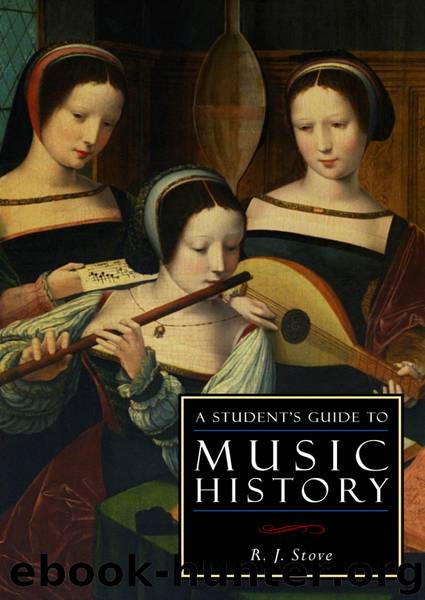A Student's Guide to Music History by R.J. Stove

Author:R.J. Stove
Language: eng
Format: epub
ISBN: 9781497645080
Publisher: Intercollegiate Studies Institute
* * *
BRAHMS, JOHANNES (German, 1833–97). The popular instinct that equates Brahms with Bach and Beethoven as one of the “three Bs”—Hans von Bülow seems to have been the first person to lump those three composers together—has this to be said for it: of all great composers Brahms was the most historically aware, weighed down by his encyclopedic knowledge of ancient musicians as diverse as Schütz and Couperin. Hence his decision to delay writing any of his four symphonies until his forties: his first earned from Bülow the accolade “Beethoven’s Tenth,” a half-truthful description that nettled Brahms himself. Like Beethoven, Brahms combined bachelorhood with waspishness, though regrettably, he did not in fact utter the epigram attributed to him: “If there is anyone here whom I have not insulted, I beg his pardon.” He hated empty virtuosity—during a Liszt recital he is said to have fallen fast asleep—but his piano compositions, in particular, abound in practical difficulties and failed to enter the mainstream repertoire until long after his death. His lifelong deep love of Bach and Handel emerged in, above all, his German Requiem (not a Requiem Mass setting, despite its name: Brahms, a Protestant insofar as he practiced any creed, simply set to music various verses from Luther’s Bible). Bernard Shaw might have complained that this Requiem “is patiently borne only by the corpse”; posterity’s verdict on it has been much more welcoming, and its place among the nineteenth century’s finest choral works is now unassailable, as are the places of all his symphonies among the nineteenth century’s finest orchestral works. In the field of song, Brahms can often stand alongside Schumann and Schubert. His chamber music is, on the whole, less performed and less attractive (an exception is his late and movingly nostalgic Clarinet Quintet). He lived long enough to make—in 1893—a sound recording, in which he plays the piano (badly) and utters a few words of greeting to Thomas Edison.
Download
This site does not store any files on its server. We only index and link to content provided by other sites. Please contact the content providers to delete copyright contents if any and email us, we'll remove relevant links or contents immediately.
Aircraft Design of WWII: A Sketchbook by Lockheed Aircraft Corporation(32279)
The Great Music City by Andrea Baker(31915)
Call Me by Your Name by André Aciman(20489)
The Secret History by Donna Tartt(19038)
The Art of Boudoir Photography: How to Create Stunning Photographs of Women by Christa Meola(18612)
Shoot Sexy by Ryan Armbrust(17720)
Plagued by Fire by Paul Hendrickson(17402)
Portrait Mastery in Black & White: Learn the Signature Style of a Legendary Photographer by Tim Kelly(16996)
Adobe Camera Raw For Digital Photographers Only by Rob Sheppard(16968)
Photographically Speaking: A Deeper Look at Creating Stronger Images (Eva Spring's Library) by David duChemin(16678)
Ready Player One by Cline Ernest(14636)
Pimp by Iceberg Slim(14481)
Bombshells: Glamour Girls of a Lifetime by Sullivan Steve(14047)
The Goal (Off-Campus #4) by Elle Kennedy(13651)
Art Nude Photography Explained: How to Photograph and Understand Great Art Nude Images by Simon Walden(13029)
Kathy Andrews Collection by Kathy Andrews(11810)
The Priory of the Orange Tree by Samantha Shannon(9058)
The remains of the day by Kazuo Ishiguro(8969)
Thirteen Reasons Why by Jay Asher(8887)
